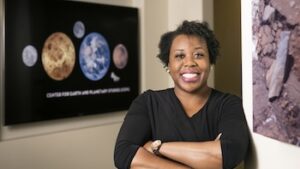
Lynnae Quick
*The birth of Lynnae Quick is celebrated on this date in 1984. She is a Black planetary geophysicist and Ocean Worlds Planetary Scientist.
Lynnae C. Quick was born and raised in Greensboro, North Carolina, and graduated from James Benson Dudley High School. In high school, she became interested in astronomy after learning about the death of stars and the creation of supermassive black holes. Quick received her Bachelor of Science degree in physics from North Carolina Agricultural and Technical State University, graduating summa cum laude. While at North Carolina A & T, Quick became interested in characterizing exoplanets and planetary geology.
After graduating, she followed this interest with an internship at the Applied Physics Laboratory with encouragement from astrophysicist Beth A. Brown. She spent the summer studying Europa, one of Jupiter's moons there. Quick received her Master of Science degree from The Catholic University of America in Washington, D.C., in physics with a concentration in astrophysics. There, she pursued research at Goddard Space Flight Center. Quick received her Doctor of Philosophy degree from Johns Hopkins University in 2013. As a Postdoctoral Program (NPP) Fellow at Goddard Space Flight Center, she studied volcanic domes on Venus and Europa and cryovolcanic activity on Saturn's moon Enceladus.
During that time, she became a co-investigator on the Europa Imaging System, conducting analyses on the moon's geyser-like plumes and beginning her work as a team member on NASA's Europa Clipper mission. Europa and Enceladus shoot water through their plumes, evidence of an ocean below their icy surfaces. Quick's postdoctoral work centered on characterizing these geologic processes and understanding how they differ across planets and satellites.
Following her postdoctoral fellowship, Quick became the first African American staff scientist at the Smithsonian Institution's Center for Earth and Planetary Studies. In 2019, she joined NASA's Goddard Space Flight Center as an Ocean Worlds Planetary Scientist, specializing in studying ocean worlds in the Solar System and beyond. Quick and her colleagues have found evidence to support this hypothesis, analyzing patterns of spots of varying brightness across Ceres surface, which correspond to pockets of brine under the asteroid's surface that craters have exposed.
In 2020, Quick was the lead author of a NASA study that analyzed 53 terrestrial exoplanets that were all a similar size to Earth. She mathematically modeled the geologic activity of these planets by estimating their internal heating rates as a proxy for potential volcanic activity. They found that all 53 exoplanets likely have volcanic activity and that more than a quarter of these exoplanets could be ocean worlds — and could thus potentially sustain extraterrestrial life. In addition to continuing her work as a team member on NASA's Europa Clipper Mission, Quick is also a science team member and Program Coordinator for the Student and Early Career Investigator Program on NASA's Dragonfly mission to Titan.
In 2021, asteroid 37349 was named Lynnaequick in her honor, and she received the American Astronomical Society's Division for Planetary Sciences Harold C. Urey Prize. Quick also received the 2021 Alumni Achievement Award from North Carolina A&T State University's College of Science and Technology. Quick and her husband, Lamar, live near Washington, DC.